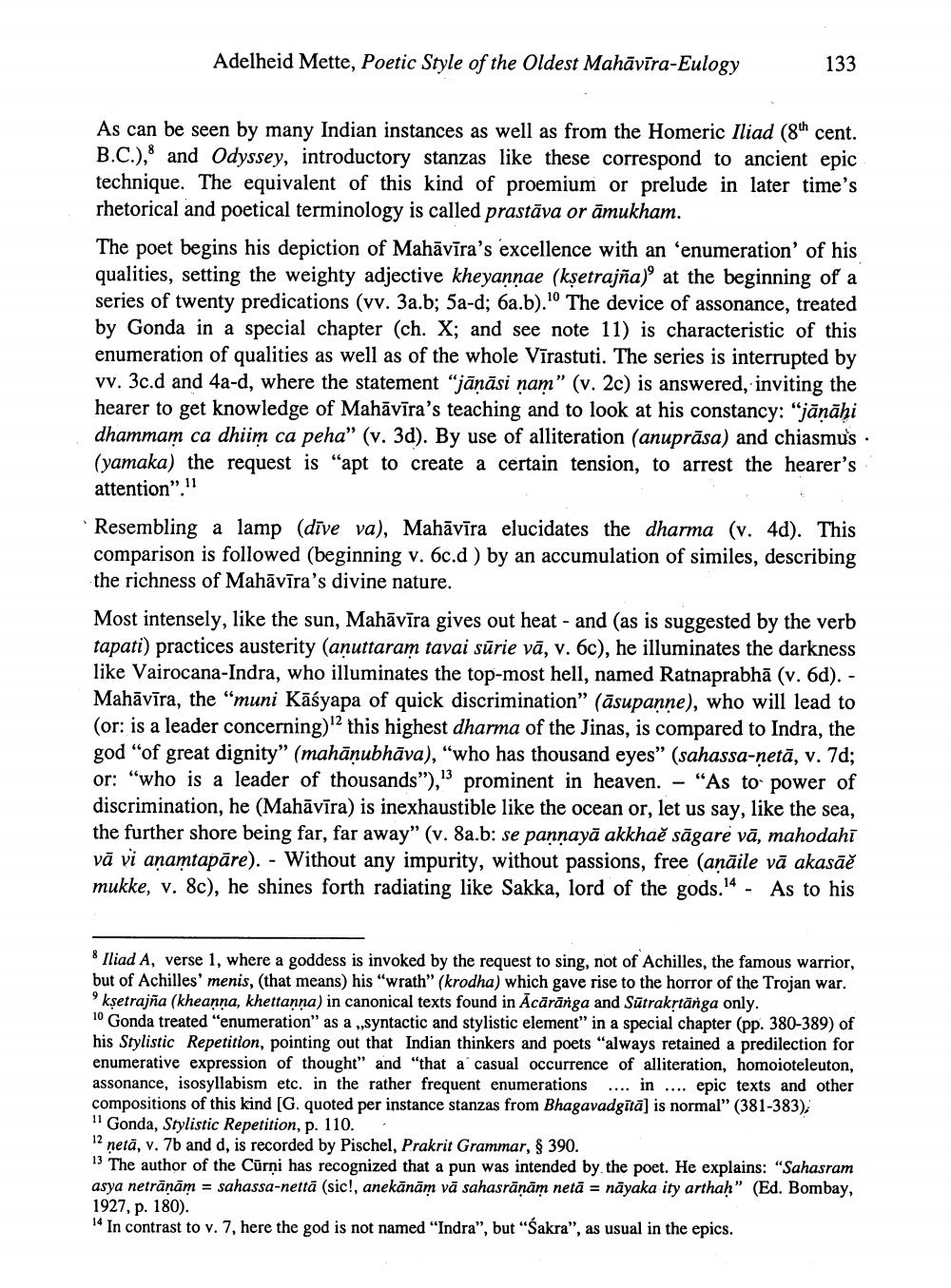________________
Adelheid Mette, Poetic Style of the Oldest Mahāvīra-Eulogy
133
As can be seen by many Indian instances as well as from the Homeric Iliad (8th cent. B.C.), and Odyssey, introductory stanzas like these correspond to ancient epic technique. The equivalent of this kind of proemium or prelude in later time's rhetorical and poetical terminology is called prastāva or āmukham. The poet begins his depiction of Mahāvīra's excellence with an enumeration of his qualities, setting the weighty adjective kheyannae (kşetrajña) at the beginning of a series of twenty predications (vv. 3a.b; 5a-d; 6a.b). The device of assonance, treated by Gonda in a special chapter (ch. X; and see note 11) is characteristic of this enumeration of qualities as well as of the whole Vīrastuti. The series is interrupted by vv. 3c.d and 4a-d, where the statement “jāņāsi nam” (v. 2c) is answered, inviting the hearer to get knowledge of Mahāvīra's teaching and to look at his constancy: "jānāhi dhammam ca dhiim ca peha" (v. 3d). By use of alliteration (anuprāsa) and chiasmus (yamaka) the request is "apt to create a certain tension, to arrest the hearer's attention”. 11
· Resembling a lamp (dīve va), Mahāvīra elucidates the dharma (v. 4d). This comparison is followed (beginning v. 6c.d) by an accumulation of similes, describing the richness of Mahāvīra's divine nature. Most intensely, like the sun, Mahāvīra gives out heat - and (as is suggested by the verb tapati) practices austerity (anuttaram tavai sūrie vā, v. 6c), he illuminates the darkness like Vairocana-Indra, who illuminates the top-most hell, named Ratnaprabhā (v. 6d). - Mahāvīra, the "muni Kāśyapa of quick discrimination" (āsupanne), who will lead to (or: is a leader concerning)" this highest dharma of the Jinas, is compared to Indra, the god "of great dignity” (mahāņubhāva), “who has thousand eyes” (sahassa-netā, v. 7d; or: "who is a leader of thousands")," prominent in heaven. - "As to power of discrimination, he (Mahāvīra) is inexhaustible like the ocean or, let us say, like the sea, the further shore being far, far away” (v. 8a.b: se pannayā akkhaě sägare vā, mahodahī vā vi anamtapāre). - Without any impurity, without passions, free (anāile vā akasāě mukke, v. 8c), he shines forth radiating like Sakka, lord of the gods.14 - As to his
8 Iliad A, verse 1, where a goddess is invoked by the request to sing, not of Achilles, the famous warrior, but of Achilles' menis, (that means) his "wrath" (krodha) which gave rise to the horror of the Trojan war.
kşetrajña (kheanna, khettanna) in canonical texts found in Ācārānga and Sūtrakstānga only. 10 Gonda treated "enumeration" as a ,,syntactic and stylistic element" in a special chapter (pp. 380-389) of his Stylistic Repetition, pointing out that Indian thinkers and poets "always retained a predilection for enumerative expression of thought" and "that a casual occurrence of alliteration, homoioteleuton, assonance, isosyllabism etc. in the rather frequent enumerations .... in .... epic texts and other compositions of this kind (G. quoted per instance stanzas from Bhagavadgitā] is normal" (381-383); "Gonda, Stylistic Repetition, p. 110. 12 netā, v. 7b and d, is recorded by Pischel, Prakrit Grammar, $ 390. 13 The author of the Cūrņi has recognized that a pun was intended by the poet. He explains: "Sahasram asya netrānām = sahassa-netta (sic!, anekānām vā sahasrāņām netā = nāyaka ity arthah" (Ed. Bombay, 1927, p. 180). 14 In contrast to v. 7, here the god is not named "Indra", but "Sakra", as usual in the epics.




